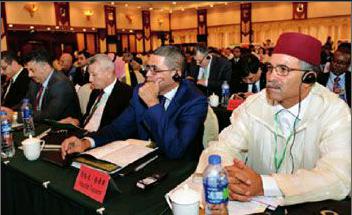CHINA’S NEW DIPLOMATIC HORIZON
2015-02-10ByRobertLawrenceK
By+Robert+Lawrence+Kuhn

An “inflection point” in mathematics occurs when there is a change of curvature, say from concave to convex, at a particular point on a curve. There is now, at this particular point of time, an inflection point occurring in Chinas diplomacy, as the country changes from reactive to pro-active in its international relations. Future historians may characterize this transformation as one of the defining geopolitical trends of the first half of the 21st century.
I am pleased to see Chinas emergence but too many outside the country are not—they worry, openly or privately, about what a strong China may do. The so-called “China threat” is real in that many believe it to be real. But do these people know the real China?
Late Chinese leader Deng Xiaoping (1904-1997) once said that China should “keep a low profile and bide our time.” His directive is often misinterpreted as advising that China, like a growing lion, should lie low while strengthening itself so that eventually it can pounce. In fact, Deng wanted China to focus on building its own economy so that, in addition to enhancing the standard of living of the Chinese people, China could never again be bullied by foreign powers and would finally take its rightful place among the great nations of the world.
Has Chinas “time” now come? Chinese President Xi Jinping has given his clearest direc- tive for Chinas foreign policy and it is certainly more engaged with the world. Speaking to senior officials at the 2014 Central Conference on Work Relating to Foreign Affairs, Xi described Chinas new diplomacy.
Articulating the “strategic objectives and principal tasks of foreign affairs work,” Xi stressed safeguarding Chinas core interests, crafting a conducive international environment and hastening the nations emergence as a great power. China, he said, should“make friends and form partnership networks throughout the world” and “strive to gain more understanding and support from countries all over the world” for the Chinese dream [of the renewal of the Chinese nation]. Moreover, China should “develop a distinctive diplomatic approach befitting its role of a major country” in an increasingly multipolar world.
Xi recognizes that China cannot compete for global leadership by power alone. Economic and military strength, while necessary, are not sufficient. There must also be a moral or ethical component to Chinas development: China must ride the high road, offering an alternative geopolitical vision that is in some sense superior to that of the West. China, Xi asserted, should“see to it that equal importance is attached to justice and benefits, stress faithfulness, value friendship, carry forward righteousness, and foster ethics.”
A few days after the conference, at a study session of the Political Bureau of the Central Committee of the Communist Party of China on regional free trade, Xi called for China to“participate and lead, make Chinas voice heard, and inject more Chinese elements into international rules.” To effect such historic change to the world order, Xi is reshaping the diplomatic landscape with new global thinking of “active engagement.”
The One Belt and One Road initiatives[the Silk Road Economic Belt and the 21st Century Maritime Silk Road] are Xis new plan for multinational development and exemplify his strategic thinking. Actualizing the initiatives by appealing broadly to the roughly 50 countries that have signed on, Xi created the $40-billion Silk Road Fund to complement the more general $100-billion Asian Infrastructure Investment Bank.
Speaking to the Sixth Ministerial Conference of the China-Arab States Cooperation Forum in Beijing in June 2014, President Xi enumerated principles of working together that apply broadly to the 21st Century Maritime Silk Road (from Xis book The Governance of China). “Looking back on the history of exchanges between the Chinese and Arab peoples, we immediately think of the land Silk Road and the maritime spice route. Our ancestors ‘crossed the desert for months on end on post-horses,and ‘sailed the oceans day and night, putting themselves at the forefront of friendly exchanges between different nations in the ancient world,” he said.
Philosophically, to promote the Silk Road spirit, Xi described four fundamental principles: boosting mutual learning between civilizations, respecting each others choice of development path, focusing on mutually beneficial cooperation and advocating dialogue and peace.
Practically, to implement the Silk Road spirit, Xi called for Chinese and Arab sides “to be both farsighted and down-to-earth” and suggested a “1+2+3” cooperation pattern:“1” refers to cooperation in energy, the whole industrial chain of oil and natural gas; “2” refers to “two wings”—one being infrastructure and the other being trade and investment, including Chinese investment in energy, petrochemicals,agriculture, manufacturing, and services in the Arab states; “3” refers to using three advanced technologies—nuclear energy, space satellites and new energy—as breakthrough levers.
For China to fulfill its potential as a global leader, it must gain the worlds respect for its principles and philosophies, not only for its economy and military. This involves appreciation for Chinas self-determined “road of development” and for its political system.
This is a larger topic but such appreciation can develop only with a kind of convergence, where Chinas political system continues to reform, with increasing transparency and freedom, and where foreigners come to understand that pragmatic competence managing Chinas complex society trumps idealistic ideologies of multi-party democracies.
For China not to view the United States as its adversary, not as a threat to its system and government, Washington will have to accept that the Western democratic model may not be ideal for all nations at all times(the recent Middle East should teach this lesson). The United States must appreciate that China must continue to determine and develop its own system.
In my dream of a post-adversarial world, China would assume increasing responsibility for world peace and prosperity. In seeking the moral optimum, China may have to tear up old scripts, which may be in Chinas own best interests.
For its part, the United States should reject the Cold War mentality of “containing China,” as resisting Chinas rise would be both archaic and self-defeating. Of course there would remain areas of contention—balance of trade, human rights and territorial disputes—but different political systems should not be one of them. Politico-economic theories constructed in the 18th and 19th centuries have little utility in the 21st century, where all nations seek optimized models of free markets and government regulation that by nature can be neither generalized nor static.
I believe that it is in the national interests of China and the United States to work together such that their foreign policies begin to converge. Surely there are nationalistic issues, and conflicts can compound when parochial media focus on disputed borders. But border disputes do not determine national wealth, and national dignity is not ultimately measured by maps. The real achievements of nations—increasing citizens standard of living—are not the zero-sum games of jousting over slivers of land or sea but are the synergistic accretions of advanced education, knowledge creation and technology utilization.
I do not advocate that China follows the U.S. model; it must pursue its own self-interests, which stress improving the standard of living and the countrys increasing prominence and prestige. To secure the former, China requires international stability. To enable the latter, China must take the moral high ground in international affairs.
China becomes a leading nation by asserting, not by resisting, moral leadership, even if problems are complex. I applaud China for assuming more responsibility in promoting global stability. In todays world, the real conflict is not between opposing political systems but rather between the forces of modernity, competence and development and those of ignorance, exploitation and oppression.
As such, Chinas increasing engagement with global diplomacy should be celebrated.
